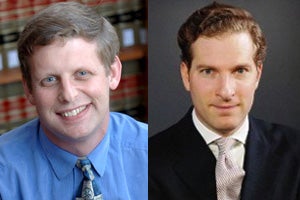Eugene Volokh, professor at UCLA School of Law, well known to some law students for his blog, The Volokh Conspiracy, gave a lecture on slippery slope arguments at an event sponsored by the Harvard Law School Federalist Society on September 20th. He was joined by Noah Feldman, Bemis Professor of International Law at Harvard Law School, who provided a response.
The talk was based on a law review analysis Volokh published analyzing the arguments. In his talk last Volokh described the slippery slope arguments as a series of steps.
“A classic slippery slope argument is, ‘If you take Step A, you will soon find yourself taking step B, and we can all agree that B would be bad. We can avoid the bottom of the slope by avoiding the first step.’ When people say that, they’re making an exaggeration, and that gives slippery slope arguments a bad name,” he said.
“Slippery slope arguments are actually about looking at public policy in a dynamic way, and recognizing that every decision changes the political and economic conditions under which future decisions are made.”
In his response, Feldman separated two different kinds of conservatism – traditional and contemporary. The slippery slope argument is in line with the traditional conservative view that presently things are as they ought to be, and we ought to be wary of changing them. A typical slippery slope appeal to traditional conservatives is that we cannot take this small step A, because it will lead to this larger step B, and that first incremental change will lead to far greater changes. Contemporary conservatism, on the other hand, focuses specifically on the economic, rational method of reasoning. Traditional conservatism is deeply rights-based. Rights are often claimed to have existed before, such that leaders never admit that they’re creating a new right, he said. By contrast, the language of contemporary conservatism is the language of cost-benefit analysis.
“The one word that captures traditional conservatism is ‘cautious,’” Feldman said. “By contrast, contemporary conservatism has no a priori commitment to caution, just to figuring out what the most rational way to do something is. What’s striking about that in historical terms is that it’s close to the position of the Enlightenment, which is that the idea that just because something has happened previously isn’t a reason we should care about it.”
Feldman says that Volokh’s paper is valuable because it plays up the contrast between the traditional way of thinking about legal problems, and the contemporary rational way of looking at them, and it shows the conflicts between them.
